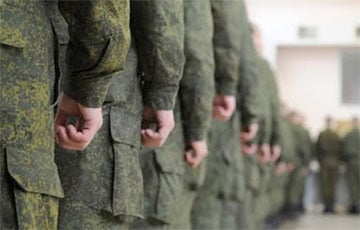ISW: Another Mobilisation May Await Russia
2- 16.09.2024, 10:39
- 5,392

Putin, however, is afraid of it.
Russian dictator Vladimir Putin is not inclined to announce a new wave of mobilisation in Russia. However, he does not rule out such a possibility.
This is reported by the American Institute for the Study of War (ISW).
Analysts published this conclusion commenting on the recent statement by Kyrylo Budanov, head of the Main Intelligence Directorate of the Ukrainian Defence Ministry, that the Russian Federation wants to end the war with its victory by early 2026 at most.
On Sunday, September 15, Budanov said at the 20th Yalta European Strategy meeting in Kyiv that the Kremlin considers 2025 a crucial year. According to him, failure to secure victory in Ukraine by early 2026 will undermine Russia's aspirations to remain a global superpower for the next 30 years.
The MID head said Russia expects the economic and socio-political situation to deteriorate by mid-2025, as well as growing difficulties in recruiting people into the military. In particular, the military have already experienced a shortage of personnel and a decline in the number of new volunteers signing up.
For insight, ISW cites data noting that at least 36 Russian regions have increased lump-sum payments to contract soldiers in 2024, with at least 11 regions paying them 1 million rubles ($11,000) or more. This in turn is probably an indication of rising costs and difficulties in the ability of the Russian military to continue recruiting.
Budanov also said that the AFU operation in Kursk Region, combined with Ukraine's constant strikes inside Russian territory, had demoralised Russian citizens and undermined the Russian public's perceptions of Russia's invincibility.
The head of Ukrainian intelligence assessed that the growing problems will force Putin to make a critical decision: either to launch another risky and controversial mobilisation or to reduce the intensity of fighting in Ukraine.
ISW notes, however, that Budanov's assessment implicitly assumes that the West will maintain support for Ukraine at current levels for the next one to two years.
At the same time, it remains not clear what Putin can do between now and 2026 and how effective his efforts to offset the consequences of Russia's war in Ukraine will be. Including through such partners as Iran, North Korea and China.
Analysts believe that despite all of the above, Putin remains hesitant to announce another partial mobilisation for fear of internal discontent.
The Russian dictator is likely to continue instructing the Russian Defence Ministry to continue ongoing mobilisation efforts until such efforts begin to lag far behind operational needs on the frontline in Ukraine.
Therefore, Putin retains the option of announcing another round of mobilisation, as he did in the autumn of 2022, despite his desire to avoid having to do so.
ISW also assesses that the Kremlin is not willing to agree to a reduction in the intensity of fighting, as it views maintaining the initiative across the theatre as a strategic imperative.
Finally, the analysts write that it remains not clear whether Putin would respond with another round of mobilisation if faced with another crisis similar or more serious than the one the Kremlin faced in the autumn of 2022.
ISW does not provide a clear answer because Russia's investments in developing the Russian force generation system, the military economy, and international defence relations have grown over the past two years and are likely to continue to grow through 2026.











